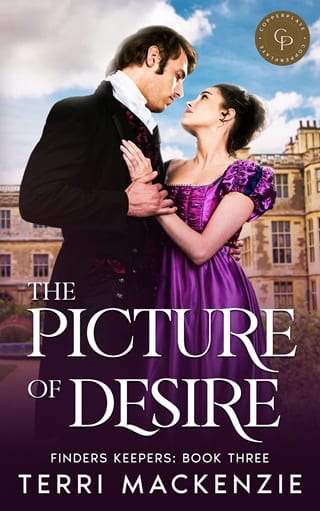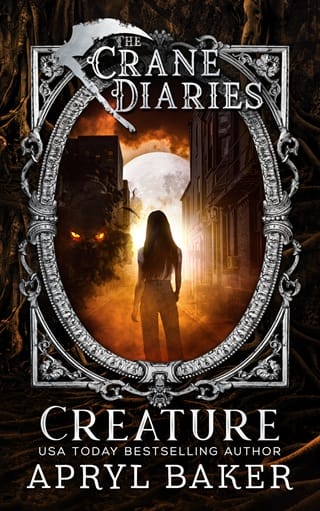Chapter Twenty-Six
Henry stepped inside Beaumont House with the quiet, tired silence of resignation. Jarvis, the butler, gave a rare smile and opened the door wider. "Welcome home, Lord Eynsham," he said, ushering him inside. "And may I say what a relief it is to have you home, sir."
Yes, no doubt it was. Henry cracked a smile of his own, though he could sense how poorly it sat on his face. As though his body was merely going through the motions, no intention behind it.
"Is my father at home?" he asked.
"Yes, sir. Although I believe he is still in bed, sir."
"I see. And my mother?"
"Henry?" His mother, drawn from one of the upstairs rooms like a wraith, descended the stairs dressed in a blue so pale it could almost have been white. Even now, she moved with her habitual grace, breeding not having deserted her. She clasped both his hands with hers. "Thank heavens you are home."
Outside, though he could not hear it, he imagined the carriage bearing Louisa moving away down the cobbled street.
In the end, it had barely been a goodbye. She had looked at him, eyes sorrowful and luminous, and the silence had said everything they had needed to. He had not proposed again, and she had not said anything that implied she had hoped he would.
Now all he was left with was an aching in his chest and a profound tiredness that went much deeper than muscles or bones.
"I'm sorry I never gave word that I was coming," he said, letting his mother guide him up the stairs.
"Oh no, no." She paused to cup a hand to his cheek. "We're always so grateful to have you home. But I was going to write to you—Oliver arrived home last night."
Henry barely managed to suppress a groan. "He did? Before the end of term?"
"I believe he's facing a suspension. And there's some issue of outstanding debts he's not in a position to pay. Came home to ask you and your father for help." She clucked her tongue disapprovingly. "Of course, I don't like the gambling, but it's in his blood, dear. Just like his father and your grandfather. There's nothing to be done."
"I would beg to differ, ma'am."
"You can't be too hard on him," his mother said anxiously. "Why, he's not yet nineteen."
"He should know better than this, when he knows full well that—" Henry broke off. "Never mind that. Where is he?"
"Still in bed, my love. You know, you have arrived really quite early. Half the household is not awake yet."
"Once he's washed and breakfasted, send him to the study." Henry caught his mother's hands between his. "And don't worry. All will be well."
"Has Miss Winton consented to be your wife yet?" she asked, looking up at him with a crease between her brows. "Only . . . Things do seem to be particularly difficult of late."
He made a mental note to visit the bank again and see if there had been any major developments. A week was perfectly long enough for his father to have lost a fortune at cards.
"All will be well," he repeated, and left her to her frown, shutting his bedchamber door behind him and standing in the middle of the room with a pounding head. Moments later, his valet arrived with warm water for washing, and he did so mechanically.
First he would speak with his father, then with Oliver.
"Is the Earl awake yet?" he asked Bootley, his valet.
"I believe so, sir," Bootley said doubtfully. "But he has not yet left his bed."
"That doesn't matter. Inform him that I will see him presently."
Bootley's expression cracked the tiniest of amounts, but he inclined his head and moved away again. Henry adjusted his cravat and pushed his damp hair back from his head. Just hours ago, Louisa had kissed his forehead, smoothing away the lines that formed there so often now. Just hours ago, her hands had been on his bare neck and she had whispered words there she'd hoped he wouldn't hear.
I will miss you, and I wish I would not.
If that was the case, she ought to have married him and have done with it.
His father's bedchamber door was closed, and Henry rapped the wood with his knuckles before entering, not so much as waiting for his father's bid to enter. The chamber was dark, the sunlight straining through the heavy green curtains, and his father sitting up in bed and regarding him with a baleful expression.
"So," he said with the hint of a sneer. "You have come back from the country empty-handed, I see."
"Mother told me Oliver arrived home last night."
"Aye, and so he did, the little wretch." His father sounded unconcerned about the entire situation. "He'll be wanting an advance on his allowance."
"And I suppose you told him he could have it?"
His father scrubbed a hand down his face, and Henry noticed that the man looked just as weary and beaten down as he felt. Worse, perhaps, because the ravages of drink had left their mark. "I don't have the patience for one of your lectures today, Henry."
"Do we have the funds, sir?"
His bloodshot eyes narrowed. "That's hardly your concern."
"You say you don't have the patience for my lectures, but I don't have the patience for your prevarications. Do we have the funds?"
"I have already written to Norfolk."
That was a resounding no. Of course, if they could not afford to send Oliver the money, it must be found somewhere—the boy could not default on his debts.
And yet.
And yet .
He sank into the armchair. "When I went to Drummond's and spoke to Mr Pickford, he led me to think we had until the end of the summer before we risked losing this house."
"An old bore," his father said with distaste.
"Nevertheless, he has a certain knowledge of our situation, do you not agree?" Henry folded his arms. "I've been gone a week. How do things stand?"
"You cannot take that tone with me."
"Have you lost a great deal at the table in that time?"
The Earl's nostrils flared, but his silence was answer enough. Never mind; he would find out the truth from Drummond soon enough.
"I will be addressing myself to the accounts and bills from now on," he said. "It seems if they are to be handled, I must do it. And if you have any objection, perhaps you should try addressing them yourself." He rose. "I'll see myself out."
It was almost noon when Oliver knocked on the door of the study, by which time Henry had ample time to discover the depths of their ruin.
His father had been to see moneylenders, and the repayments were looming. These were accounts the bank was not aware of, no doubt, as they did not rely on a withdrawal, but it certainly meant they were in a pretty pickle.
His head pounded and his vision swam, and he contemplated all the ways he could think to resolve this disastrous mess they were in.
So far, all he could alight on was to sell their London home.
Oliver's sandy head poked through the door, and he entered the room with a sullen cast to his mouth. He was built along his father's proportions, tall and sulkily handsome, but he had inherited his mother's brown eyes—the only child to not have the Beaumont blue.
"I wasn't expecting to see you," he said as he took a seat. "Mama said you were in the country."
"And so I was," Henry said. "But I returned early."
Oliver folded his arms. "Of course you did."
"I'll save you the lecture," Henry said dryly, recalling Louisa's words. If you speak to him as a man, as an equal, expressing the reality of your situation, perhaps he will find his own way forward. "No doubt you wouldn't attend me anyway."
"Then what am I in here for? Father said he would see to my debts."
For the first time, Henry looked at his brother as a fellow adult, albeit one more concerned with others' opinions. He was dressed in the height of fashion, shirt collars high and pointed—a little too much for Henry's taste, but then he had never been a proponent of fashion—and his cravat tied flamboyantly. But there was a serious cast to his merry brown eyes, the hint that one day he would steady down if given the chance.
Henry sincerely hoped he would.
"Let me be frank," he said, laying all his cards on the table. "The position we are in is close to ruinous. We have more to repay than—oh, than even Miss Winton's dowry could cover."
Oliver looked momentarily interested. "Is that the lady you're going to marry?"
"No," Henry said shortly. "But until recently I was considering it. How much did you lose?"
The sulkiness returned to Oliver's expression. "Father already said he would repay it."
"Father is applying to Nathanial. I would rather have the sum so I know what numbers we're dealing with."
Oliver sent Henry a quick, embarrassed glance. "Play was a good deal deeper than I had realised."
"Badly dipped, are you?"
"Four thousand."
With some difficulty, he kept his expression neutral. "I see."
"Nathanial can afford to pay it," Oliver said.
"Perhaps he can, but what about next time?"
"Father said not to worry about a few petty gambling debts, and that when he won again, as he certainly would, he would pay them all off himself."
Of course he'd said that. His father was all about when he would ‘come about' again; his life motto was that he would provide for everything when he had a win.
And sometimes he did win, but not often enough. Not nearly often enough.
"It's not that simple," Henry said. "This isn't a case of a few bad losses, Oliver. If it were—do you think I've been so hard on you merely because I disapprove of excessive gambling?"
Oliver frowned. "Yes?"
"I've been so hard on you because the family suffers ruin if we do not curb our spending. Our father most of all, but what should happen to you if we lose everything, as we are liable to do?" He paused, glancing down to where his hands were curled into fists on the table. "Nathanial can help keep you in Oxford, but if you learn bad habits there, we cannot support you. And Nathanial will not, either. As things currently stand, we will barely be able to furnish you with an allowance—and only then if we sell this house."
Oliver blanched, pushing back from his chair with unwonted vehemence. "Sell the London house? Are you out of your mind?"
"As things stand, it's the only way I can see out for us."
"But it's been in the family for—well, longer than I've been alive."
And a good deal longer than that. The Shrewsburys had always had a house on Grosvenor Square. Unfortunately, it was an expense they could no longer countenance.
"If our current rate of expenditure does not abate," Henry said carefully, "then we will face losing the entire Shrewsbury estate."
"I thought you were going to marry."
He did his best not to flinch. "As did I, but unfortunately things did not pan out that way."
Oliver frowned, the last natural merriment dying from his eyes as he rested his elbows on the desk. "Can we not take out a loan against the property?"
"We are already mortgaged to the hilt. There is no room for us to borrow, no funds for us to use, and the sum is far greater than we could ever hope to repay, even if we all began to practice economy." Which, he knew, they would not. "If we are lucky, I will contrive for us to keep the house, but we will probably have to parcel off some of the land."
"Then things are very much worse than Father led me to believe," Oliver said slowly.
"Father has always been highly optimistic—at times I have thought deluded—about our situation and his ability to recoup his losses," Henry said, "though it pains me to criticise our parents. Mother knows what he is and has made no discernible effort to curb him. She believes gaming to be in his blood, and therefore yours, too. But I have done everything in my power to ensure that is not the case."
Oliver's face was pale but resolute. "What can I do?"
"Return to Oxford when they next allow you in. Nathanial will provide the funds to pay your debts, and endeavour to keep out of trouble for the remainder of the term."
"And you?"
"I?" Henry scratched at the stubble on his jaw. He had yet to sleep after a night spent wide awake and dreaming. "I will determine if we have to sell the house and make all necessary preparations to leave London."
 Fullepub
Fullepub 



